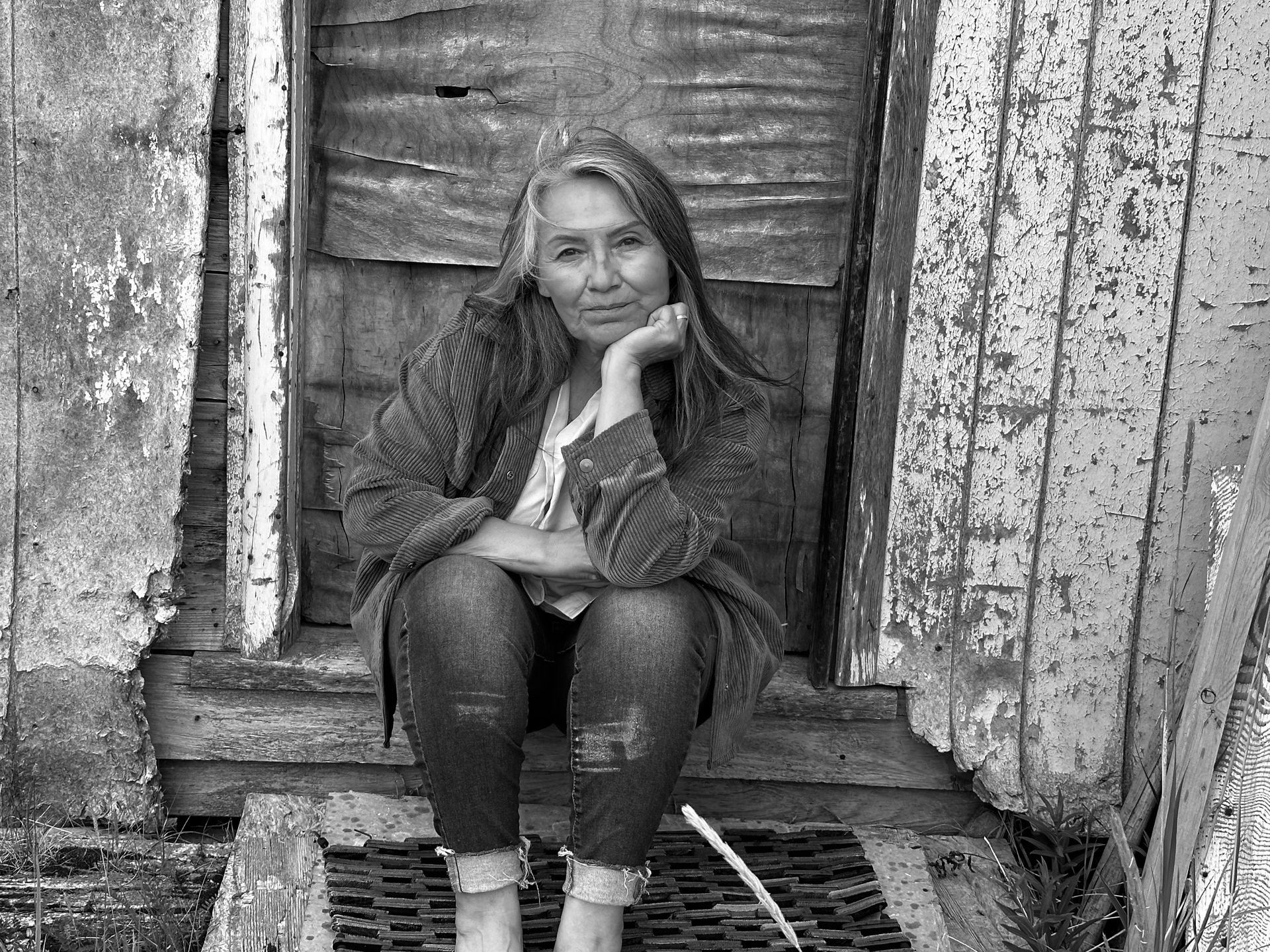Phyllis Sinclair was born in Churchill, Manitoba, the only prairie harbour town in Canada, and the Polar Bear Capital of the World. Churchill sits at the end of the Hudson Bay rail line. Flanked on one side by the Churchill River and the other by Hudson's Bay, Sinclair was highly influenced by its teaming waters of Beluga Whales, Capelan, and foreign freighters that transformed the river into a giant movie screen that she watched from on the rocky shoreline. One might have called her a dreamer back, spending days running along the rocks picking tundra berries and rafting in the precambiran shield rock pools that formed from the gales and storms. Raised by her mother, and grandmother, Sinclair learned her Cree culture by listening to their stories and watching them practising survival skills, plucking geese, skinning fish, tanning hides and making mukluks. Every Saturday morning trapper relatives who came in on the train would gathered at the Sinclair home where her grandmother would have coffee and hot bannock awaiting them. There, the elders would sit catching up around the wood stove in the Sinclair's tiny kitchen. Phyllis loved listening to their laughter as they relived their weekly glories and follies. Often there would be foot-tapping, spoon-clacking gatherings where she and her siblings would be asked to entertain with a little jig. She wrote of these times in Morning Laughter on her award winning album, Dreams of the Washerwomen.
Sinclair’s uncle was a hunter. His hunting forays would fill their kitchen with wild fowl and game. This kept the family through the long Winters. Down from fowl became duvets and pillows, Fox tails became trim on their parka hoods, while Caribou and Moose became their mittens and boots, protecting them from sub-arctic blasts. In early days, Phyllis’ grandmother made her living as a washerwoman, hauling water from the river, and heating it on the old wood stove. She wrote of her grandmother’s days as a Washerwoman in Washerwoman's Lament. Later her mother, and grandmother gained employment with the military laundry facility as "Laundresses".
Although Sinclair has many wonderful childhood memories of her hometown, her family did not escape the negative effects of government imposed decisions that prevented her people from practising and living their culture. Residential school policies meant many of her friends and relatives would be sent to residential schools. She clearly remembers standing on the railway station platform, watching faces in the train window as it pulled away bound for residential schools. She also remembers her grandmother’s panic when the Indian Agent, or Game Guardian came to town.
The closing of the military base forced the family to leave Churchill in search of work. The family moved south to the capital city of Winnipeg. Not finding immediate meaningful work, the family could only afford housing in the inner city. Refusing the welfare line, budget-stretching often meant eating suppers at the local Salvation Army soup kitchen. Winnipeg’s Main Street seemed to be the only place to find other indigenous families. Main Street was a tough place at night, but by day it wasn't so bad. Sinclair wrote of their time spent on the inner city in her song Main Street on Fathomless Tales from Leviathan's Hole.
It was in Winnipeg that Sinclair learned her first three guitar chords. She began to sing at churches and local coffee houses, where she met and learned from other musicians. Life eventually improved. Her mother’s determination to upgrade and earn her social work degree, and her grandmother's masterful beadwork enabled the family to move out of the inner city to a more safe neighbourhood. Later, her mother’s work moved the family back up north to Thompson. This is where her grandmother left for the other side. Her mother retired as a social worker in Thompson where she worked for the provincial government for over thirty years. Her mother is laid to rest there. The loss of her mother and grandmother was difficult as they were strong examples of strong character, and dogged determination. These two hard working indigenous woman left an indelible mark on Sinclair. She says that her focus on social justice comes from navigating the experiences they encountered away from the safety and acceptance of their home community. However, her upbringing was also very bright. She, and her family were saved by the Native Friendship Centre where they attended dances and gatherings. She loved listening the radio playing quietly under her pillow at night. And laughter? There was also a lot of that. The women’s ability to maintain their sense of humour while working through challenging circumstance tempered the difficult times.
A word that Sinclair often heard while growing up was the Cree word Kiyam. Kiyam means, Let it Be, don't worry about it". She believes that this philosophy, and the family’s spirituality sustained them. Sinclair says, ‘I’m grateful for their teachings, and example that they set for us. They taught us that attitude is everything. Life will have its struggles, but quitting wouldn't get us anywhere. I proudly walk in their moccasins."
Sinclair earned her Master's Degree in Business Admi nistratiionafter working as a Journalist and current affairs radio host for the Canadian Broadcasting Corporation in Vancouver, British Columbia. She went on to manage the Salmon Gillnet Fleet for Ocean Fishersies in Prince Rupert, BC prior to launching her career in music.

